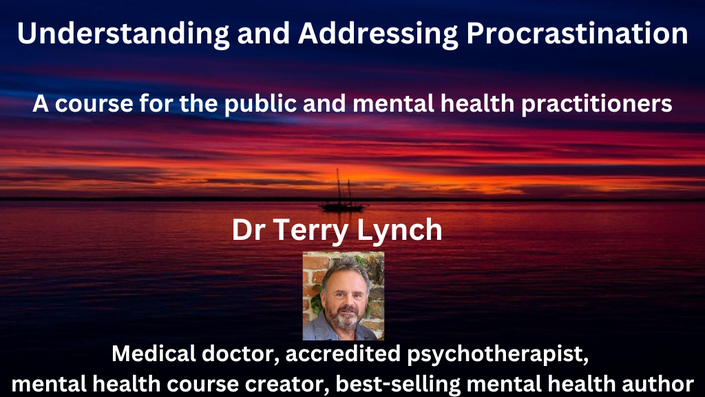
Understanding and Addressing Procrastination
For the public and mental health professionals
25% price discount applies until 7th February 2025.
If you struggle with procrastination, or you are a mental health practitioner and you want to increase your understanding of procrastination, this course is for you.
In order to effectively address procrastination, it is necessary to understand this habitual pattern and why we might have come to adopt procrastination as a regular habit.
Therefore, there are two sections within this course:
1. Understanding procrastination.
2. Addressing procrastination.
Each section contains a video and the slides I used to create the course material.
Section One contents:- Understanding Procrastination:
Course overview; what exactly is procrastination?; what purpose(s) procrastination might serve; the intended consequences of habitual procrastination; is there a profile of people who tend to habitually procrastinate? the wounding-to-wounded-self cycle, as it applies to habitual procrastination; much wounding/trauma is/has been less obvious, but very real nevertheless; how we may alter our priorities secondary to trauma; the “losses”/unintended consequences of habitual procrastination; progressive corrosive effect on one’s sense of self, and how this happens; feelings are real and valid as feelings, but they are not facts; the lenses we wear, and how these apply to procrastination.
Section Two contents: Addressing Procrastination:
Fully accept the realities of procrastination, as presented in the previous module of this course; create a strategy to address procrastination; no time frames; approach this as an ongoing moment-by-moment project; prioritising noticing, prioritising awareness; quickly interrupt the flow of thoughts; draw up a plan of action; addressing tasks/procrastination feels like being at the foot of Mount Everest; the ongoing perpetuation of a vicious circle; reduce Mount Everests to little hills; the only way to eat an elephant: one bite at a time;
reluctance/resistance is natural, so expect it; you do not have to believe that you can address procrastination in order to address procrastination; it is not what you believe that matter – it is what you (choose to) do that matters; three important quotes; your goal is the doing, not the outcome(s) or the quality of the outcome(s); small steps, taken (relatively) frequently; begin with a small and time-limited bite; make a deal/negotiate with yourself; just begin – somewhere; commit to the task for e.g. 20 minutes; return to the task again soon, e.g. within 12-24 hours; continue with this process, e.g. once every 12-24 hours; after 3-4 sessions of this, you will see (the beginnings of) a “result”;
write a sentence after e.g. every 5-10 minutes of reading/research; the same strategy principles apply to addressing any task, e.g. writing an email; “timing is everything” – begin early in the process, not at the last minute; inevitable consequences of habitually leaving things to the last minute; continue to employ this process until the test is completed; apply this strategy to your next task, in precisely the same manner; this way of operating/doing will not be embedded within you after one such sequence; apply this strategy to your next task, and then to your next task, and then to your next task.
As I describe within the course, it is best to approach the course and the course work without a sense of stress or urgency.
If procrastination is causing many problems in your life, then it is understandable that you would be eager - impatient even - to eradicate procrastination from your mind and your life.
However, addressing long-standing habits and patterns such as procrastination works best when we are gentle with ourselves. Within the course, I provide many tips for how to approach the course and the course work in this manner.
Once you have enrolled, you have long-term access to the course and the course material.
30-day refund:
A 30-day full "no-quibble" refund applies to this course, if for any reason you are not satisfied with it.
Contacting me:
You can connect with me any time, either directly within the course itself or by emailing me at terry@doctorterrylynch.com
I am happy to hear from you if you have any questions, comments or opinions about the course material, or if you are having any particular struggles with procrastination or related issues.
Get started now!
Your Instructor

Terry's own life experiences and his life as a mental health activist, medical doctor, psychotherapist and mental health author have brought him to a level of understanding of mental health that is unusual if not indeed exceptional.
Terry Lynch has played a prominent role in mental health both nationally and internationally. For a nine-year period, he was appointed by the Irish Department of Health and Children to key national mental health groups - The Expert Group on Mental health Policy (2003-6) which formulated A Vision for Change, Ireland’s official mental health policy document; The Independent Monitoring Group for A Vision for Change (2006-9); the Second Monitoring Group for A Vision for Change (2009-12).
Terry Lynch was the only mental health professional to be appointed to the three Groups named above. In addition, he was also appointed by the CEO of the Irish Health Service Executive (HSE) to the Irish Health Service Executive's Mental Health Expert Advisory Group (2006-8).
Terry is the author of 4 books: Prescribed Drug Dependence (Kindle, 2018); Depression Delusion Volume One: The Myth of the Brain Chemical Imbalance (2015); Selfhood: A Key to the Recovery of Emotional Wellbeing, Mental Health and the Prevention of Mental Health Problems, (2011); and best-seller Beyond Prozac: Healing Mental Distress (2004).
He has appeared regularly in the national media in Ireland and beyond.



